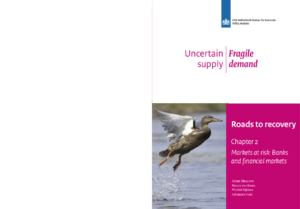Roads to recovery, chapter 2: Markets at risk: Banks and financial markets
- Disruptions in credit supply have large, negative consequences for macroeconomic performance.
- Small and medium size firms have been hit much harder by the Great Recession than larger firms.
- Key risk in the recovery is the repair of the balance sheets of Dutch banks. Financial problems with firms may resolve themselves as economic recovery gathers pace.
Developments within the financial sector influence how the recovery takes shape.. Macroeconomic performance will not return to normal unless credit intermediation recovers. Weaknesses in the banking system have the potential to hamper recovery.
The current period of low economic growth started with the banking crisis sparked by the fall of Lehman Brothers in 2008. The banking crisis hit banks in all of the major economies including the Netherlands, where nearly all of the major banks required government support. Empirical evidence shows that banking crises go hand-in-hand with disruptions in credit supply. These disruptions have large, negative consequences for macroeconomic performance.
In the Netherlands, bank lending growth fell from over 10% prior to the Great Recession to about 3% until mid 2013. Since July 2013, however, lending to firms in the Netherlands has even contracted, which makes the recent developments in bank lending in the Netherlands more similar to the crisis-countries of the periphery than the core euro area countries. Economic theory gives us two channels through which developments in financial markets impact the supply of credit and the real economy: the bank lending channel, which depends on the strength of banks’ balance sheets, and the financial accelerator, which depends on the strength of borrowers’ balance sheets.
Banks that are weakly capitalised, heavily dependent on short-term external finance or hold poor quality assets will likely reduce the supply of credit in an attempt to rebuild their balance sheets and to make themselves resilient to liquidity shocks. There is some tentative evidence that Dutch banks are relatively sensitive to those factors that make the bank-lending channel more powerful. The comprehensive review currently being undertaken by the ECB will shed more light on the health of Dutch banks.
Equally, firms’ ability to obtain external finance depends on their financial health: those with weak balance sheets are unable to convince lenders that they will not default on their debts and have difficulties obtaining credit. Some firms are reliant on bank financing. As such, small and medium size firms have been hit much harder by the Great Recession than larger firms. A key risk in the recovery is the repair of the balance sheets of Dutch banks. Financial problems with firms may resolve themselves as economic recovery gathers pace.
Downloads
Contacts

